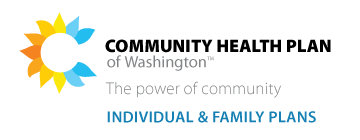CHPW and our providers are responsible for keeping members well, both body and mind.
We provide care for our members across the full continuum of physical and behavioral health services.
Your Responsibilities as a Provider
As a primary care provider, you are responsible for coordinating with your patient’s behavioral health provider. You do not need to submit a referral for your patient’s mental health or substance use treatment.
If you need help finding an appropriate behavioral health provider for your patient, please call CHPW, or direct your patient to call on their own behalf. No referral is required to see a mental health provider.
As a Behavioral Health Provider, you are responsible for conducting an initial assessment for first-time patients to assess their level of need. You will coordinate with your patient’s primary care provider to create an appropriate care plan.
If you are a Behavioral Health Provider, you are responsible for conducting an initial assessment to determine treatment needs. You must also assess whether they meet Washington’s Access to Care Standards, and secure follow-up appointments with an appropriate behavioral health provider.
CHPW Will Ensure Access to Care
Providers seeking mental health treatment for their CHPW patients are no longer burdened with making multiple calls. CHPW has a Customer Service process to take on the responsibility of ensuring access to an appropriate mental health providers for members. Simply instruct members to call Customer Service if they need help finding a mental health provider. Care management staff will identify available providers in the area and secure an appointment for your patient.
The CHPW process is designed to reduce challenges faced by members who are searching for mental health provider. Since primary care providers often help patients access specialty services, including behavioral health, we want to let providers know about the new process for members to call CHPW Customer Service.
Multichronic Care Management (MCCM)
MCCM is available for high‐risk members with multiple chronic conditions exacerbated by behavioral comorbidities and psychosocial challenges. MCCM focuses on addressing physical, psychological, and social drivers of maladaptive behavior. This helps members increase motivation, adhere to treatment, and achieve their personal health goals. Contact the Health Services Team for more information or to refer a member.
Summary of covered services
Psychiatric and substance use disorder
- Acute Psychiatric Inpatient Mental Health
- Electroconvulsive therapy (ECT)
- Evaluation & Treatment
- Inpatient Acute Substance Abuse Withdrawal Management (Detoxification)
- Psychological and neuropsychological testing
- Repetitive Transcranial Magnetic Stimulation
- Crisis Stabilization in a residential setting
- Substance Use Disorder inpatient rehabilitation and residential treatment center
- Psychiatric inpatient residential treatment center
High-intensity outpatient programs
- Intensive Outpatient Program (IOP)
- Partial Hospitalization Program (PHP)
Lower Acuity Services
- Counseling
- Psychiatric Collaborative Care Model (CoCM)
- Health and Behavior interventions
- Mental Health screening
- Medications for Opioid Use Disorder (MOUD)/Medication-Assisted Treatment (MAT)
- Substance Use Disorder Treatment
Child and Adolescent Behavioral Health
CHPW offers special coordination support for our members with behavioral health needs through Customer Service. This includes helping our members find a provider and schedule appointments. Case management is also covered for every CHPW member.
Children and adolescent services
- First Episode Psychosis (FEP)
- Child Development Supports (Washington State Department of Children, Youth & Families)
- Parents Helping Parents
Behavioral Health Resources
Evidence-Based Practices
- Evidence-Based and Research-Based Best Practices – Reporting Guidelines (HCA)
- Evidence-Based Practice Institute (EBPI)
- Clinical Integration Resources for Integrated Managed Care
Training
- Find a list of trainings on CHPW’s Clinical Practice Trainings
- Mental Health Technology Transfer Center Network (MHTTC) – Training and technical assistance (TA) in evidence-based practices (EBP)
- Northwest Addiction Technology Transfer Center (NWATTC)
- Evidence-Based Practices Training (see also EBPI)
- CBT+ Training (UW Medicine)
- Cognitive Behavioral Therapy for psychosis (CBTp)
University of Washington Consultation
The University of Washington offers several services to support providers with consultation and training support including:
- Psychiatric Consultation Line (PCL) for Adults
- Seattle Children’s Partnership Access Line (Perinatal PCL)
- UW Perinatal Psychiatric Consultation (Perinatal PCL)
- Psychiatry Addictions Case Conference (PACC)



